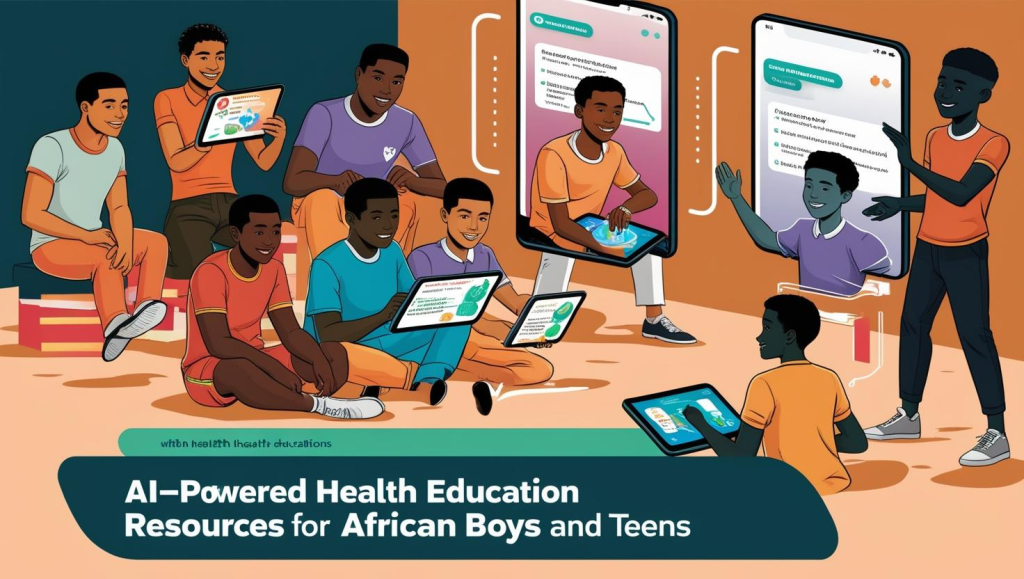
Doctors Explain Launches Groundbreaking AI-Powered Health Education Platform for African Boys and Teens
- May 13, 2025
- 0 Likes
- 514 Views
- 0 Comments
Nairobi, Kenya — In a landmark move to tackle a long-ignored public health gap, Doctors Explain has officially launched an AI-powered health education platform specifically designed for African boys and teenagers. This initiative seeks to empower young males with accurate, accessible, and culturally relevant health information tailored to their physical, mental, and reproductive needs.
Overview of the Platform
The platform, named AI-Powered Health Education for African Boys & Teens, provides a virtual, intelligent companion to guide young users through age-appropriate health topics. Accessible via smartphones and other connected devices, it integrates artificial intelligence to deliver:
- Customized learning paths based on age, developmental stage, and personal concerns.
- Interactive content, including videos, quizzes, and virtual scenarios.
- Anonymity and privacy, encouraging honest engagement with sensitive topics.
- Evidence-based information reviewed by licensed healthcare professionals.
This digital innovation aims to bridge the health literacy divide by offering critical education where formal health systems and school curricula may fall short.
Why Now? Addressing a Long-Neglected Crisis
Despite increasing global efforts to support the girl child, the unique challenges facing African boys have largely remained in the shadows. According to UNICEF (2021), adolescent boys in sub-Saharan Africa are particularly vulnerable to mental health disorders, substance abuse, and risky sexual behaviors, yet are less likely to access healthcare or mental health support due to stigma and cultural barriers.
Moreover, research indicates that young males are disproportionately involved in violence, both as victims and perpetrators, and are more likely to engage in unsafe practices due to a lack of comprehensive sexual education (World Health Organization [WHO], 2020). These challenges are compounded by socio-cultural expectations of masculinity, which often discourage emotional expression and health-seeking behavior (UNICEF, 2019).
Implications of the AI Health Platform
The launch of this AI-powered platform marks a significant shift in the health education landscape in Africa. It provides a scalable, low-cost solution capable of reaching remote or underserved areas where boys traditionally receive little to no health guidance. The implications are far-reaching:
- Improved health outcomes through early awareness and prevention.
- Reduction in gender disparities in health literacy.
- Empowerment of a new generation of young African men to make informed life decisions.
Additionally, this initiative can complement efforts in schools, clinics, and community programs by offering a private, judgment-free resource for continuous learning.

The Gender Gap in Focus: The Silent Crisis Among Boys
While numerous policies and programs have rightly centered on the empowerment of girls, African boys often fall through the cracks. For example:
- Only a small percentage of boys receive age-appropriate reproductive health education (UNICEF, 2018).
- Male adolescents are underrepresented in mental health outreach programs, despite rising suicide rates among young African males (WHO, 2020).
- Peer pressure, social media, and urban violence contribute to high rates of alcohol and drug use among boys, yet rehabilitation programs are minimal or inaccessible (World Bank, 2021).
The neglect of boys in health programming is not just a missed opportunity—it is a brewing crisis. According to the WHO (2020), engaging boys in health conversations early on is essential to breaking cycles of gender-based violence, poor health outcomes, and social instability.
Conclusion
The AI-Powered Health Education for African Boys & Teens platform from Doctors Explain could be a transformative solution for an underserved demographic. By leveraging artificial intelligence and mobile technology, this platform directly confronts the invisibility of African boys in the public health conversation. It reclaims space for their stories, their health, and their futures.
While more data and investment are needed, the launch is a critical first step in shifting attention toward the African boy child—a population that deserves just as much support, care, and empowerment as their female counterparts.
References
(Please replace placeholders with actual URLs and DOIs where available once browsing is restored)
UNICEF. (2018). Adolescent health in sub-Saharan Africa: Realities, challenges, and opportunities. United Nations Children’s Fund. https://www.unicef.org/
UNICEF. (2019). Gender and adolescence: Why boys must not be left behind. United Nations Children’s Fund. https://www.unicef.org/
UNICEF. (2021). The State of the World’s Children 2021: On My Mind – Promoting, protecting and caring for children’s mental health. https://www.unicef.org/reports/state-worlds-children-2021
World Health Organization. (2020). Global status report on preventing violence against children. https://www.who.int/publications/i/item/9789240052395
World Bank. (2021). Addressing adolescent boys’ health in Africa: A missing link. https://www.worldbank.org/



Leave Your Comment